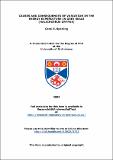Causes and consequences of variation in the energy expenditure in grey seals (Halichoerus grypus)
Abstract
Oxygen consumption of captive grey seals was measured over a period of 2.5 years at the
captive facility of the Sea Mammal Research Unit at the University of St Andrews. The
conditions under which in-water resting metabolic rate (RMR) was measured had a
significant effect on the resulting estimates. RMR was highest when seals were at the
surface breathing periodically. Surface apnoea and periodic submergence reduced RMR
estimates by 25 and 35% respectively. There was significant seasonal variation in RMR's of
adult females, with rates being highest in the spring and declining throughout the summer
months. This variation was unrelated to changes in water temperature. Changes in mass
explained some of this variation but this seasonality was still evident when rates were
expressed mass-specifically. RMR of juvenile grey seals increased with age, as did lean
body mass, although there was no relationship between age and total body mass.
Diving metabolic rate (DMR) was measured while seals were voluntarily diving in a quasi-
natural setting. Overall DMR was lower than RMR measured in the same animals. Mean
DMR was 1.6 times predicted BMR. Average DMR decreased with dive duration and
increased swimming activity during dives increased DMR. A model was developed that
predicts DMR given information on the behaviour during the dive. This model was used to
predict the at-sea metabolic rate of 5 wild grey seals from telemetry data. Overall, predicted
at-sea metabolic rates were similar to DMR of the captive seals. Travelling dives had a
higher energetic cost than foraging dives. Feeding during diving caused DMR to be
increased 1.4-1.6 times pre-feeding levels.
Metabolic rate data was incorporated into a population energy flux model. Energy
requirements of different components of the population were estimated on a quarterly basis
and all these were summed to produce an estimate of population annual energy
requirements. Error in input parameters were used to calculate confidence limits in these
estimates.
Type
Thesis, PhD Doctor of Philosophy
Collections
Items in the St Andrews Research Repository are protected by copyright, with all rights reserved, unless otherwise indicated.

